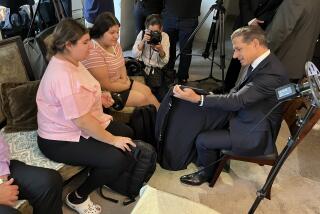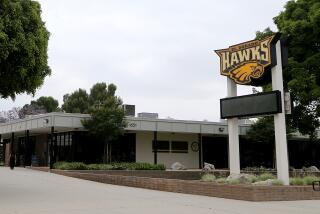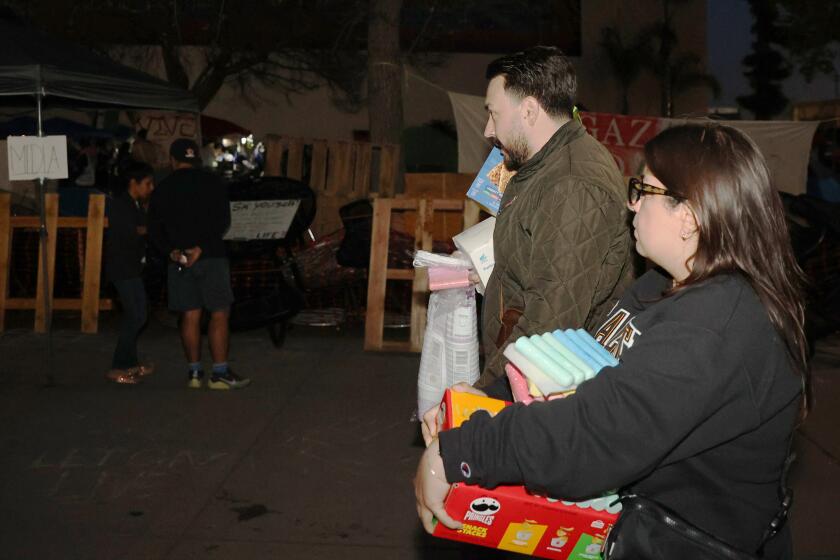Lesson Forces HIV Testing of Students : Health: Instructor is given a letter of reprimand after 10 sixth-graders prick their fingers with a shared pin.
A sixth-grade teacher trying to show her students what their own blood looks like under a microscope inadvertently taught a frightening lesson in public health, forcing the children to be tested for HIV and hepatitis infection because they pricked their fingers with the same straight pin.
“It may sound like we’re stretching it, but if you have a disease that--for all we know--kills everyone who gets it, I don’t think it’s stretching it to get them tested,” said Marilyn Gunnell, president of Glendale Leaders for AIDS Awareness.
Health authorities said it appeared that the students probably suffered no harm.
On June 8, instructor Chrissy Wynn, who teaches health and social studies at Mark Keppel Elementary School, directed 10 sixth-grade students to prick their fingers and place a drop of their blood on a slide, according to Glendale school officials.
Although some students used individual pins, Wynn apparently reused the same pin on several children after cleansing it with alcohol, said Vic Pallos, a spokesman for the Glendale Unified School District.
School officials alerted health authorities after an alarmed parent called the following day, according to Keppel Principal Gordon Morse.
“My teacher wanted us to see what blood looks like,” said student Michael Markossian, 13. “The next thing I knew, we got a call telling me I had to go to the doctor because I might have a disease.”
Wynn should have known better, Morse said, because she also teaches a drug-abuse prevention program that includes material on the risk of sharing needles.
All 10 students underwent tests for HIV and hepatitis B and C, said Dr. Shirley Fannin, Los Angeles County director of Disease Control Programs. Some tests on two students are pending, but the remainder proved negative, she said Thursday. There is no need to wait months for HIV virus to appear if it turns out none of the children had it to begin with, Fannin said.
Fannin termed it “highly unlikely” that any of the children could have transmitted the blood-borne viruses, given their demographics. Children born in the United States who are not sexually active are unlikely to have had contact with such diseases, she explained.
County health officials, nonetheless, recommended both HIV and hepatitis tests to eliminate any lingering doubt, Fannin said.
“The recommendation was to test all these children for those diseases known to be blood-borne in this community,” Fannin said. “It’s predictably a low-risk group, but it does not take away responsibility to ensure that the risk is zero or close to zero.”
Fannin expressed alarm that school officials, and particularly a health teacher, would not have exercised more caution. She criticized the use of a common, unsterilized straight pin, saying that practice alone caused her to doubt the safety of the entire procedure.
Swabbing the pin with alcohol would be a safeguard only if meticulously done, leaving not even a microscopic trace of blood on the pin, Fannin said.
“It would be dangerous to assume that a person could be so wrong about one part of the procedure and do the rest correctly,” she said.
The health department probably will remind school officials about the dangers of blood sampling, Fannin added.
Pallos said Wynn apparently violated Glendale Unified School District guidelines, which allow classes to use human blood only if it is obtained through commercially prepared slides. The lesson is not part of the regular curriculum, and the district has issued a letter of reprimand to Wynn, he said.
The neighboring Los Angeles Unified School District has banned any use of human blood in experiments since 1974, said John Liechty, director of middle schools in the district’s Division of Instruction.
Wynn would not comment on the matter when contacted at the school.
“She takes full responsibility for what happened,” said Morse, the principal, who described Wynn as distraught over the incident. “She said, ‘If I had any idea that I was causing the kids any kind of danger, I never would have done it.’ ”
“Frankly, I was surprised that the kids shared the pins because with the [drug abuse] training they should have known better,” Morse said. “But I guess because they were cleaned in alcohol, they felt they were safe, and so did Mrs. Wynn.”
Wynn has taught at the school for five years, Morse said.
However remote the risk of infection, parents in Glendale remain worried until all tests results come in.
Ardines Markossian said she nearly fainted when she heard that her son Michael had been part of the blood experiment.
“I got so scared,” she said. “How can they do something like this without telling the parents about it?”
More to Read
Start your day right
Sign up for Essential California for news, features and recommendations from the L.A. Times and beyond in your inbox six days a week.
You may occasionally receive promotional content from the Los Angeles Times.







